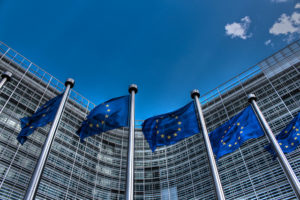The EU moves forward with new copyright rules
European lawmakers are moving forward with new copyright rules despite warnings from digital rights advocates over measures they say could increase internet censorship and stifle freedom of expression. Last week, the EU’s Legal Affairs Committee (JURI) approved the Copyright Directive, which overhauls the EU’s copyright law and holds companies legally accountable for monitoring and enforcing the new rules.
Among the more controversial provisions is Article 13, which requires all content uploaded online in the EU to be checked for copyright infringement. According to the Electronic Frontier Foundation (EFF), Article 13 means that any website that allows users to post “text, sounds, code, still or moving images, or other copyrighted works for public consumption will have to filter all their users’ submissions against a database of copyrighted works.” The directive requires websites to use “appropriate” measures to prevent infringing content from appearing on their platforms, which critics say is not only vague but also excessively burdensome on companies, which are likely to err on the side of over-censoring content in order to avoid breaching the new copyright rules.
Internet and telecommunications companies should be transparent to their users about their policies and practices for filtering, removing, or otherwise blocking access to content, whether in compliance with national laws or for breaches to the company’s own rules. They should clearly disclose their processes for identifying content that breaches these rules and report the volume and nature of content removed. Results from the 2018 Corporate Accountability Index show that companies across the board fail to disclose sufficient information about these processes.
U.S. Supreme Court rules in favor of digital privacy
In what has been hailed as a triumph for digital privacy, the U.S. Supreme Court on June 22 ruled that mobile phone location data cannot be seized without a warrant. The ruling effectively extends Fourth Amendment search and seizure protections to cell phone location data. While the court’s ruling is narrow in scope, “the ruling has broad implications for government access to all manner of information collected about people and stored by the purveyors of popular technologies,” said the ACLU’s Nathan Freed Wessler, who argued the case.
Internet and telecommunications companies receive a growing number of requests from government authorities and law enforcement to hand over user information. Companies should clearly disclose to users their process for responding to these requests, and publish data on the number of requests they receive and comply with. Results of the 2018 Corporate Accountability Index show that out of the ten telecommunications companies evaluated in the Index, seven companies disclosed limited information on how they respond to external requests for user data. Only AT&T, Vodafone, Telefónica, and Orange disclosed some data on these requests.
Government blocks Tor in Venezuela
Access Now reports that Venezuelan internet service provider (ISP) CANTV has blocked access to Tor, the popular circumvention tool which allows users to access the internet anonymously. The government-owned ISP is also the largest provider of internet services in the country.
In recent years, Venezuelans have witnessed a steady decline of human rights under the Maduro regime. In addition to offline attacks against journalists and activists, the government has turned to increasingly advanced methods to block online media and to gain greater control over Venezuela’s restrictive information environment. In recent months, government efforts to block local news content online resulted in an increasing number of Venezuelans using Tor to anonymously access restricted content.
In order to ensure an open internet that supports users’ human rights, telecommunications companies providing mobile and internet services should make a clear commitment not to block or prioritize certain content or traffic. This commitment should be made in a user-facing policy. However, findings from the 2018 Corporate Accountability Index show that disclosure by telecommunications companies on their network management practices is insufficient. Out of the ten telecommunications companies evaluated in the Index, three companies did not disclose anything on their network management practices (Etisalat, Ooredoo, and Orange). Vodafone was the only telecommunications company that was fully transparent in this regard, disclosing a commitment not to prioritize or block traffic. Six companies, including AT&T and MTN, provided only limited disclosure.





